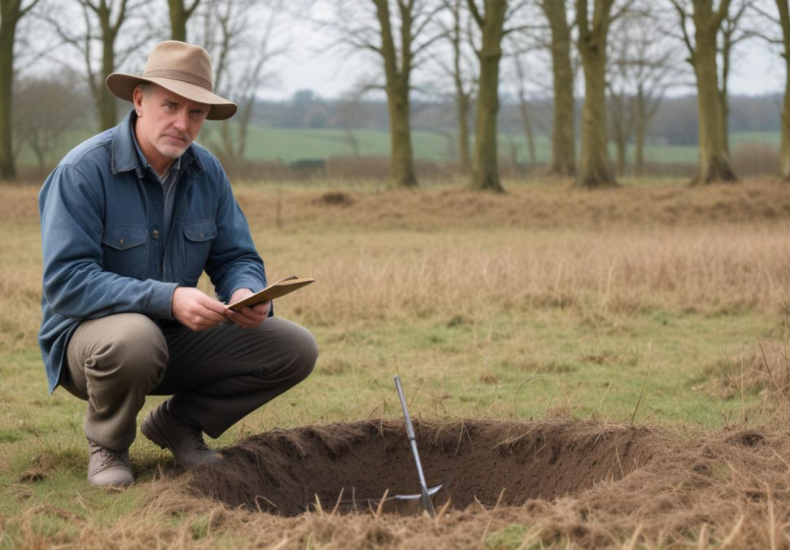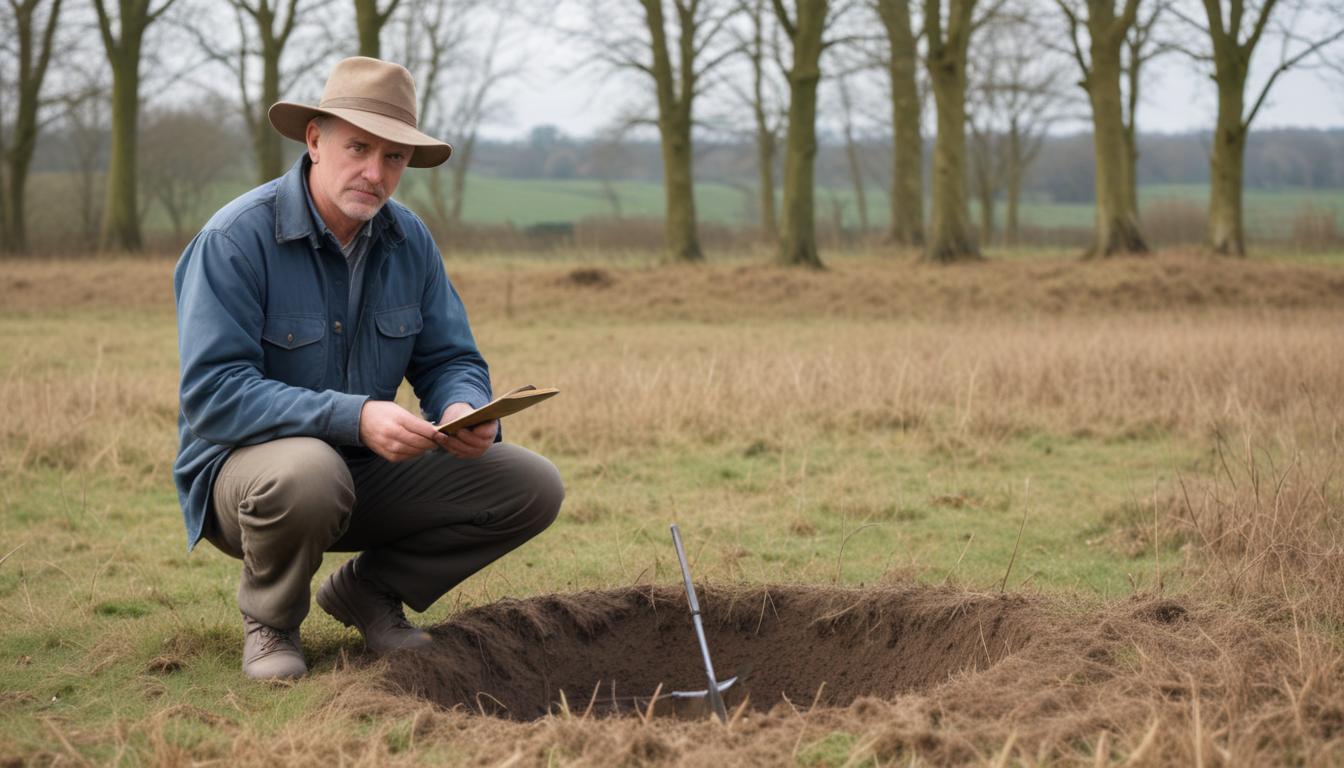
Dealing with skeptical landowners as a detectorist
When engaging with landowners, it’s crucial for detectorists to recognize and empathize with the various concerns they may have. Many landowners are understandably protective of their property and may be wary of granting land access for activities like metal detecting. This protective stance often stems from worries about potential damage to the land, such as disruptions to the soil, harm to agricultural activities, or risks to livestock. There is also the fear of liability should anyone get injured while on their property.
Moreover, landowners may be concerned about the possibility of finding and removing valuable historical artifacts without proper archaeological supervision. This not only pertains to the loss of potential historical treasures but also involves legal implications regarding cultural heritage and ownership rights. Additionally, some landowners might have had negative experiences in the past with individuals who did not respect their property, leaving gates open, littering, or causing disturbance.
Effective communication and building trust are essential in mitigating these concerns. By understanding the landowner’s perspective, detectorists can better address issues and reassure the property owners of their intentions and the steps they will take to respect and protect the land. Establishing this mutual understanding paves the way for more amicable negotiations and successful permissions for land access.
Building trust and rapport
Building trust and rapport with landowners begins with clear and honest communication. As a detectorist, it’s important to establish open lines of communication from the first interaction. This means being transparent about your intentions, the scope of your detecting activities, and how you plan to undertake them without causing harm or inconvenience. In your initial discussions, aim to convey not just your passion for metal detecting but also your respect for their property and your understanding of their concerns.
Personal meetings, if possible, are highly effective. They allow for a direct and friendly exchange of information and can help both parties feel more comfortable and understood. During these meetings, be prepared to provide detailed information about yourself, such as your detecting experience, membership in any metal detecting clubs, or involvement in historical preservation societies. Bringing along examples of previous finds, records of responsible practices, and letters of recommendation from other landowners can also greatly bolster your credibility.
Another aspect of building trust involves respecting the landowner’s time and preferences. Be flexible with your scheduling, accommodate their availability, and always ensure you stick to agreed appointments and timelines. It’s also crucial to ask the landowner how they prefer to be updated about your findings and activities on their land. Some might prefer a daily brief, while others might like a summary at the end of your session.
Furthermore, demonstrating professionalism in every interaction helps in solidifying this trust. Always dress appropriately, keep your equipment organized, and maintain a polite demeanor. Ensure you also adhere to all agreed-upon boundaries and rules set by the landowner. Following through on your commitments, such as closing gates, not leaving any litter, and minimizing disturbances to the land, confirms your respect for both the land and the owner, thereby fostering a lasting relationship based on mutual respect and trust.
All these efforts in building trust and rapport not only help in gaining initial land access but also in securing future permissions and potentially fruitful collaborations. Positive experiences can lead a landowner to recommend you to other property owners, thus expanding your opportunities for detecting in various locales.
Legal considerations and permissions
When initiating any metal detecting activity, ensuring compliance with legal requirements is pivotal for detectorists. Obtaining the necessary permissions from landowners is not just a courtesy but a mandatory step under many regional laws. This goes beyond just securing land access; it involves understanding and respecting the array of legal stipulations that govern metal detecting.
Firstly, written consent from the landowner provides a legal foundation for any search activities. This document should specify the areas approved for detecting, the duration of the permission, and any restrictions imposed by the landowner. Having such an agreement in writing helps prevent any future misunderstandings or disputes regarding land access or the scope of the permission granted.
Furthermore, it is important to be informed about any local or national laws that apply to metal detecting. Some areas might have specific regulations regarding the discovery of historical artifacts. For example, in many places, items deemed as ‘treasure’ must be reported to local authorities, and there might be legal implications related to the ownership and handling of these finds. Staying informed about these laws and communicating them clearly with the landowner underscores your reliability and integrity. This transparency builds trust and reassures the landowner that their property and any historical artifacts found there will be treated with due respect and in accordance with the law.
Additionally, ensuring that all activities are covered by appropriate insurance is crucial. This protects both the detectorist and the landowner from potential liabilities associated with accidents or damage during the detecting process. Communicating the existence of such insurance further enhances trust, as it shows the landowner that you are prepared and responsible.
Moreover, aligning with ethical guidelines set forth by metal detecting communities or local clubs can also play a significant role. These guidelines often emphasize respect for the land, reporting of finds, and sharing any financial gain from significant discoveries with the landowner. Such practices, when communicated effectively to the landowner, can greatly facilitate smoother negotiations and establish a more substantial relationship grounded in mutual respect and understanding.
Ultimately, every communication about legal considerations and permissions should aim to be as clear and detailed as possible, thereby minimizing any potential legal or relational complications. By adhering to these principles, detectorists can ensure that their passion for metal detecting is pursued responsibly and respectfully, fostering a positive atmosphere for all parties involved.
Demonstrating benefits and responsibilities

When approaching the task of demonstrating the benefits and responsibilities associated with metal detecting to landowners, it’s key to focus on how both parties can benefit from this cooperation. One of the most compelling benefits to highlight is the potential uncovering and preservation of historical artifacts that might otherwise remain undiscovered. Metal detectorists can explain how their activities contribute to the broader knowledge of local and national history, potentially increasing the historical value of the landowner’s property.
Responsibility, on the other hand, involves a commitment from the detectorist to adhere to best practices that ensure the integrity and quality of the land are maintained. This includes committing to fill any holes dug during the search, disposing of any trash found—even if it’s not theirs—and ensuring minimal disturbance to both the land and its wildlife. By emphasizing these practices, detectorists can reassure landowners that their property will be treated with the utmost respect and care.
Detectorists should also communicate their willingness to share the excitement of any significant finds with the landowner. Offering to display items found on their property in a local museum or community center can be an enticing prospect, as it not only highlights the historical importance of the discoveries but also the landowner’s role in preserving this legacy.
Futhermore, discussing the potential for financial benefits is crucial. Detectorists can negotiate agreements that include financial compensation for the landowner, either through a rental fee for land access or a share in any profits from valuable finds. Such arrangements need to be clearly communicated and documented to avoid any misunderstandings.
Trust continues to play an integral role in these discussions. Maintaining transparent communication about when and where detecting activities will take place on the property ensures that the landowner feels informed and in control of what happens on their land. Additionally, providing regular updates about findings and activities helps to foster trust and reassures the landowner that the detectorist is conducting themselves in a responsible and agreed-upon manner.
By focusing on these aspects, detectorists can make a persuasive case for the benefits of their activities while clearly outlining their responsibilities. This approach not only promotes mutual benefits but also lays a solid foundation for ongoing cooperation and trust between the detectorist and the landowner.
Resolving conflicts and continuing relationships
Resolving conflicts effectively is an essential skill for detectorists who frequently interface with landowners for access to their properties. Structured and empathetic communication plays a vital role in handling any disagreements that may arise concerning land access or detecting practices. By maintaining open lines of communication from the onset of the relationship, both parties can voice their concerns or issues directly and productively, ensuring minor misunderstandings do not escalate into larger conflicts.
When conflicts occur, it is imperative to approach them with a mindset of finding a resolution that benefits both the detectorist and the landowner. Trust, which has been carefully built up through previous interactions, becomes invaluable here. Demonstrating a consistent track record of respecting the landowner’s property and adhering to agreed-upon terms showcases reliability and respect, elements that can significantly defuse potential conflicts.
An effective way to manage and resolve conflicts is to revisit the initial agreements and openly discuss each party’s concerns. This might involve renegotiating terms that are no longer suitable or clarifying any misunderstandings regarding the scope of land access granted. In cases where new issues arise, such as unforeseen impacts on the property, both parties must collaborate to adjust practices and ensure that land and property are preserved.
Furthermore, continuing relationships with landowners after resolving conflicts is crucial. Detectorists should take the initiative to engage in regular check-ins with landowners, updating them about their activities and any interesting finds. This kind of proactive communication emphasizes respect and consideration, fostering a positive ongoing relationship. Additionally, showing appreciation for the landowner’s cooperation and patience can reinforce a positive partnership, encouraging them to continue granting access to their land in the future.
In sum, handling conflicts delicately and maintaining sincere communication are paramount. These elements ensure that relationships with landowners are not just preserved but are allowed to flourish, which, in turn, secures ongoing access and cooperation beneficial to both the landowner and the detectorist.
You may also like
Archives
Calendar
| M | T | W | T | F | S | S |
|---|---|---|---|---|---|---|
| 1 | 2 | 3 | 4 | |||
| 5 | 6 | 7 | 8 | 9 | 10 | 11 |
| 12 | 13 | 14 | 15 | 16 | 17 | 18 |
| 19 | 20 | 21 | 22 | 23 | 24 | 25 |
| 26 | 27 | 28 | 29 | 30 | 31 | |
Leave a Reply